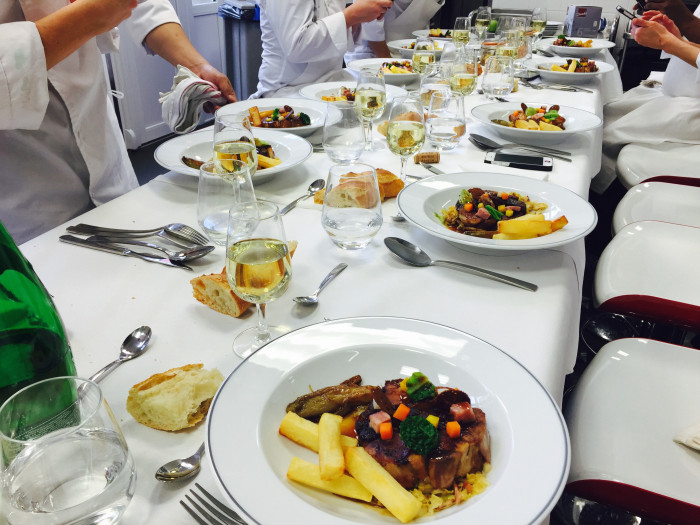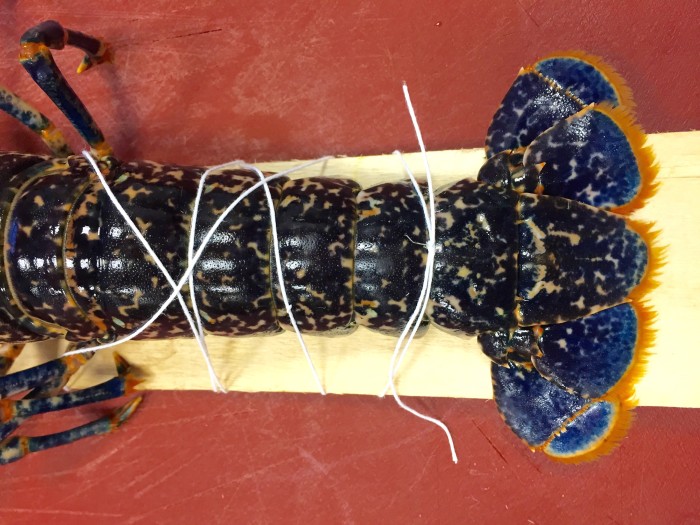What It's Like To Go To Cooking School In Paris
The idea of going to cooking school in Paris is dreamy, filled with images of whisking up soufflés and carving ducks à l'orange. It really is a dream to be taught by passionate chefs with thick French accents. But it was just a matter of time until the dream became very real and I realized that cleaning floors and getting yelled at is also very much a part of life in the kitchen.
I had already spent some time in two restaurant kitchens in Boston and Bangkok and knew the demands of a restaurant, but kitchen culture in France is very different. Here is what it's really like to go to cooking school in Paris.
Oui, Chef!
Cooking school is unlike any other school I've been to. Yes, you learn classic French recipes, but what you really learn comes more from watching, noticing and practicing. While asking questions is welcome in the classroom, the kitchen is a place of action, so learning by watching is more appreciated and may save you from getting yelled at.
You Eat Well
Going to cooking school in Paris is like going on a very intense food tour of France. We were lucky to work with local French products, like the black-footed, A.O.C.-protected chickens known as poulet de Bresse, as well as black truffles, foie gras and oysters. The school locker rooms became a place to trade goodies. We quickly befriended the pastry students because they always had two or three professional-grade cakes each at the end of the day and were desperate to give them away.
You Get One Shot, Maybe Two
The French have documented their recipes since the very beginning, and that leaves very little room for error. Your job is to follow the recipe to the letter. One day I was in charge of making a yuzu custard and completely scrambled it. My chef came over and told me to do it again, and if I made the same mistake, not to come back tomorrow.
A New Set of Skills
A chef should be able to carve like a surgeon, move like a ninja, plate like an artist and organize like no one else. The first weeks of school were all about getting into this mind-set. People from my program were mostly career changers, so think former bankers and lawyers being thrown into the kitchen. It's just like anything you learn for the first time: There's a threshold, and after you nail your knife skills, manage the heat and process the recipes, things start to come more easily.
Don't Be Late
A.K.A. "the death sentence." When you're part of a brigade like you are in culinary school, you're expected to turn up on time every day without fail. In a kitchen, everyone has a job, and if you don't show up, it can really mess with everyone else's work. I was late one day to restaurant service at school and as soon as my chef saw me sneak in from the back, he followed me to yell at me in front of everyone in the kitchen. I've managed to arrive 20 minutes early since the public shaming.
Things You Don’t Want to Do
I remember the day my team was in charge of dispatching a crate of lobsters. I said a little prayer for each one I dropped into a pot of boiling water, and got the chills as they moved under my spatula when I held them down. There was also the day I had to debone a rabbit. Yes, it was dead, but you could still see its little cute teeth and eyes.
Your Body Changes
Whether it be burns, cuts, or gaining and losing weight, I didn't realize how much change your body goes through when you're in the kitchen. Hours of standing and working around hot and sharp objects can get very dangerous. I've watched a classmate lose fingertips from a slicing machine and another lose skin from grabbing a hot copper pot. My personal favorite, since it's not so bad? Your hands constantly smell like onions and garlic.
Kitchen Talk
It's normal for there to be quite a bit of shouting and swearing in the kitchen. There's a lot of adrenaline running in cooks, which means there's not much time to be polite or politically correct. The rush and the heat in the kitchen can also get people hotheaded, but that's part of the fun of it all. I had a chef who trained us as if we were in a professional kitchen, so we got used to this culture. The chef warned us that this is nothing compared to the horror stories that happen in some kitchens. And I guess I'll see it for myself when I join the team of a Michelin-starred restaurant next month.
Going to cooking school in Paris intensifies the whole learning process. Being here means being taught by some of the best in the industry. We had visiting guests, MOFs (Meilleurs Ouvriers de France), and Michelin-starred chefs give us tips in class, which also meant that we have access to interning for them.
At the end of the day, a job in the kitchen means that you will never stop learning, and going to cooking school is only the beginning...if you survive it.




